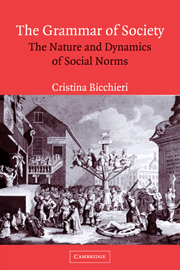3 - A Taste for Fairness
Published online by Cambridge University Press: 05 June 2012
Summary
Introduction
One of the most important concepts in social exchanges and interactions is that of fairness. We can come to accept the most onerous tasks if we are convinced that the decision procedure was fair, and, conversely, we may reject even a profitable exchange if we feel treated unfairly. Since the dawn of philosophy, a concern with fairness – what it is and how to define it – has been central to the philosopher's quest. Philosopher's concern, however, is more with finding reasons to justify and lend consistency to our intuitions about fairness than with the actual fairness judgments that people express. My interest here is to understand how people form fairness judgments and the nature of the cognitive dynamics involved in the process. Within a given culture, there is usually a great deal of agreement as to how given goods, positions, and opportunities ought to be allocated, and what properties of the claimants matter to the allocation. Every culture has developed a number of shared scripts about the fair allocation and distribution of various goods in different circumstances. Norms of fairness, in turn, are just an essential part of such shared scripts. Our fairness judgments are thus never completely subjective, independent of what our group or society considers fair given the circumstances. When we assess a situation or judge or decide about the fairness of an allocation, we apply scripts and obey norms that successfully coordinate our expectations and behaviors with the expectations and behaviors of other people.
- Type
- Chapter
- Information
- The Grammar of SocietyThe Nature and Dynamics of Social Norms, pp. 100 - 139Publisher: Cambridge University PressPrint publication year: 2005



